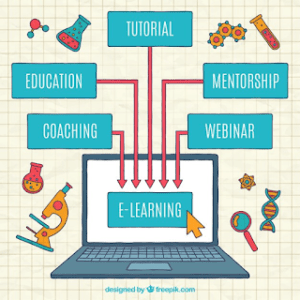
Technology is changing many industries in the digital age, and education is no exception. Let me introduce you to EdTech startups: vibrant, creative businesses that are revolutionizing teaching methods all around the world. These firms provide accessible, customizable, and adaptive solutions by utilizing technology to improve teaching and learning environments.
This piece dives into the realm of EdTech startups, examining their ascent, methods of generating cash, obstacles they face, the revolution they bring about in traditional education, and the most recent developments. Regardless of your background in education, investing or technology, this post provides insightful information about how EdTech companies are reshaping the educational landscape.
The Emergence of EdTech Enterprises
Technology’s Evolution in Education
When computers and the internet were first introduced into classrooms several decades ago, the field of education technology (EdTech) was born. However, the last ten years have seen a notable upsurge in the number of EdTech firms, fueled by the desire for more individualized educational experiences, the need for digital learning solutions, and the quickening pace of technical innovations. Important elements influencing this increase include:
Global Accessibility: Thanks to technology, students can now access education regardless of where they are in the world.
Personalized Learning: Students can study according to their own schedule and preferences thanks to adaptive learning technologies.
Data-Driven Insights: EdTech solutions give teachers insightful data to improve their pedagogical approaches.
Leading EdTech Startups in 2024
Here’s a look at some of the most successful EdTech startups that are making waves in 2024. These companies are at the forefront of educational innovation, offering products and services that address specific educational needs and challenges.
Companies–their products& services
| Startup Name | Innovation | Impact |
|---|---|---|
| Coursera | Online courses and degrees | Expanding access to higher education |
| Khan Academy | Free educational resources | Providing quality education for all |
| Duolingo | Language learning app | Making language learning fun and accessible |
| Byju’s | Adaptive learning platform | Personalized learning experiences |
| Outschool | Online classes for kids | Diverse learning opportunities |
These companies are at the forefront of educational innovation, offering products and services that address specific educational needs and challenges.
How EdTech Businesses Make Money
Revenue Streams and Business Models EdTech companies use a range of business methods to make money in order to maintain and expand their operations. Here are a few typical methods:
1.Subscription-Based Models
-Users can access premium content or features by paying a regular subscription.
-For instance, websites such as MasterClass provide access to premium courses through a subscription model.
2.Freemium Models:
-Extra features can be purchased in addition to the basic services that are provided without charge.
-For instance, Duolingo offers free language courses along with the opportunity to purchase in-app.
3.Licensing and Partnerships:
-Companies and educational institutions are the recipients of technology or content licenses from startups.
-As an illustration, Edmodo provides a learning management system in collaboration with schools.
4.Sponsorships and Advertising:
-The platform’s advertisements generate income.For instance, Quizlet provides free access in exchange for adverts, enabling ad-free use with a premium subscription.
Revenue-Generating Educational Technology
Innovative methods are also investigated by EdTech businesses to monetise their products:
-Data Analytics: Charging educators and institutions for data-driven insights.
-Corporate Training: Providing organizations with specialized training programs.
-Certification Programs: Acquiring credentials or certificates that are recognized at a cost.
Difficulties EdTech Startups Face
Travelling Through the Competitive Environment
With many firms fighting for market share, the EdTech sector is fiercely competitive. Important difficulties consist of:
-Funding and Investment: Obtaining funds to expand business and create new goods.
-Market Saturation:Standing out from rivals in a crowded field.
-Technology Integration: Making sure that the current educational systems are seamlessly integrated.
Overcoming Obstacles to Achievement
Despite these difficulties, EdTech businesses use the following tactics to get beyond barriers:
-Innovation: Constantly creating original answers to certain educational requirements.
-Partnerships: Working together to expand reach and credibility with academic institutions.
-User-Centric Design:Giving priority to customer input and experience in order to improve goods.

EdTechStartups: Revolutionizing customized learning
-Teaching and Learning Innovations
EdTech companies are using cutting-edge strategies to transform conventional educational methods.
-Blended Learning:combining in-person and virtual instruction to provide a comprehensive learning environment.
–Gamification: Including aspects of games to make learning entertaining and engaging.
-Virtual Classrooms: Making interactive platforms available for distant learning.
Example: Kahoot!
Kahoot! leverages gamification to create engaging quizzes and games for students, making learning fun and participatory.

EdTech Startup Success Story:
1.Duolingo
Overview:
Duolingo, launched in 2011, is a top language-learning platform with over 500 million users worldwide.
Key Points:
-Challenges:Engaging users and monetizing a free platform.
-Innovations: Gamified lessons and adaptive learning for personalized experiences.
-Impact:Revolutionized language learning by making it accessible and enjoyable.
-Key Data: Valuation of $5.3 billion, $369.5 million in revenue in 2023, offering 40 languages.
2.khan Academy
Overview:
Khan Academy offers free educational resources across various subjects, reaching over 120 million users globally.
Key Points:
-Challenges: Securing funding and maintaining content quality.
-Innovations: Personalized learning dashboards and strategic partnerships.
-Impact: Provided equal access to quality education for underserved communities.
-Key Data: Partnerships with NASA, a $10 million donation from Elon Musk, available in 36 languages.
3.Byju’s
Overview:
Byju’s, founded in 2011, is India’s leading EdTech company with over 100 million registered students.
Key Points:
-Challenges:Market penetration and content localization.
-Innovations: Interactive video lessons and adaptive learning.
-Impact:Improved personalized learning outcomes across India.
-Data: Valuation at $22 billion, projected $2 billion revenue in 2024, acquired multiple educational firms.
4.Outschool
Overview:
Outschool offers live online classes for K-12 students, covering a wide range of subjects.
Key Points:
-Challenges:Recruiting qualified teachers and ensuring quality.
-Innovations:Marketplace model for customizable learning experiences.
-Impact:Expanded educational opportunities with over 500,000 students enrolled.
-Key Data: Valuation at $3 billion, annual revenue of $100 million, 140,000 live classes offered.
5.Coursera
Overview:
Coursera collaborates with universities to offer online courses and degrees to over 100 million learners.
Key Points:
-Challenges:Ensuring course credibility and boosting completion rates.
-Innovations:Partnerships and micro credentials for skill-based learning.
-Impact:Made higher education flexible and accessible worldwide.
-Key Data: $600 million in revenue for 2023, 5,000 courses, $5 billion valuation.
Benefits of Technology in Education
Technology integration in the classroom has a number of advantages:
-Personalization:Adapting educational opportunities to each learner’s requirements and preferences.
-Accessibility:Giving marginalized communities access to educational possibilities.
-Efficiency: Improving instructor productivity and streamlining administrative tasks.
Recent Developments and Trends in EdTech Startups
New Developments in 2024
The EdTech sector is always changing, and in 2024, the following trends will be important to watch:
1. Automating administrative processes and improving tailored learning with Artificial Intelligence (AI).
2.Augmented reality (AR) and virtual reality (VR): Developing immersive educational environments.
3.Blockchain Technology: Protecting digital certificates and credentials.
Future of EdTech Startups
Future prospects for EdTech firms show promise for sustained expansion and innovation.
-International Expansion: Breaking into new markets and meeting a range of educational requirements.
-Sustainability:emphasizing environmentally responsible methods and solutions.
-Collaboration:Working together to promote change with governments, tech businesses, and educators.
Highlights and Conclusions
EdTech startups are leading the way in redefining education by providing cutting-edge solutions that improve student results and experiences. These firms are laying the groundwork for a time when technology and education are seamlessly intertwined, from revenue strategies to overcoming obstacles.
The Path Forward for EdTech Startups
Startups need to continue to be flexible, creative, and cooperative as the EdTech sector develops. EdTech companies may continue to transform education and society by tackling present issues and embracing new trends and making learning more accessible, engaging, and effective
FAQs
1.Describe EdTech companies.
-EdTech startups are businesses that create cutting-edge technological solutions to improve learning. Their main goal is to develop materials, platforms, and tools that enhance teaching and learning.
2.How do EdTech companies make money?
-EdTech companies make money via a range of strategies, such as corporate training initiatives, license agreements, freemium business models, subscription-based services, and advertising.
3.What difficulties do new EdTech companies face?
Securing funds, surviving a cutthroat industry, and guaranteeing a smooth merger with current educational institutions are major obstacles.
4.How are EdTech companies changing the face of education?
By bringing in innovations like gamification, virtual classrooms, personalized learning, and more, EdTech entrepreneurs are revolutionizing education and making it more approachable and interesting.
5.What current trends are EdTech startups seeing?
-New developments in education include the use of blockchain technology for safe credential verification, virtual and augmented reality for immersive experiences, and artificial intelligence for tailored learning.



This topic is simply matchless :), it is interesting to me.
Thank you for your sharing. I am worried that I lack creative ideas. It is your article that makes me full of hope. Thank you. But, I have a question, can you help me?